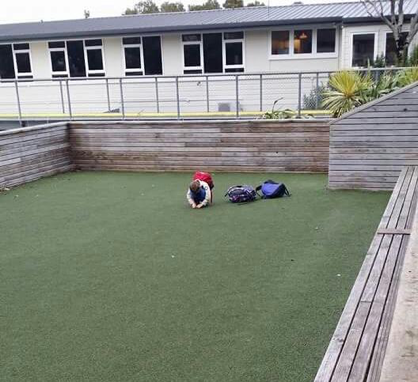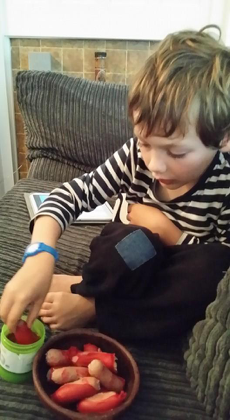I am delighted to welcome guest blogger Charlotte Fielding, who agreed to write this piece following my earlier post on Doing fieldwork with kids: Part I. These posts are part of an important conversation I think we need to have to make the carework many of us do more visible at university.
I joined the world of academia at 28 years old; a full decade older than most first year university students. I had a bunch of stuff to do first, like getting married at 21, becoming a solo mother at 24, and trying my hand at lucrative careers like being a musician, a photographer, and a small business owner. When I finally made the decision to go to university it was because I wanted a career rather than a job. I no longer wanted to try and make money from my creative pursuits, and I was ready to commit to something long term. I was exhausted from years of financial insecurity and frugality as the sole-earner, child-carer, and responsibility-bearer for my little household. I wanted to knuckle down and find a more stable and defined career path.
But I had someone else to consider, and what did my son want? Me.
In an effort to balance our needs, I decided to get the education I’d always wanted rather than go back to full time work at that point. I’m working towards improving our lives long-term but in the short-term my university schedule allows me the flexibility to pick him up from school most days and do fun things together…
 Even though he’s sometimes dejected when I get to school and interrupt his play time.
Even though he’s sometimes dejected when I get to school and interrupt his play time.
…or bring him with me, or stay home when he’s sick without having my pay docked or letting my colleagues down. It also allows me to include him in my world on a regular basis, something which most workplaces don’t encourage or allow. I have no idea if my university has a policy regarding children on campus; I don’t want to know so I’m not going to ask!
There are such high expectations of constant productivity in the workplace and other institutions that children usually aren’t welcome in those environments: they make noise and have needs and can be unpredictable. And unless an event is specified as child or family friendly, it’s usually not. These attitudes unfortunately have the result of not only excluding children from ordinary or extraordinary experiences, but it excludes their parents as well. Particularly if, as in my case, you’re a solo parent and you just miss out if you can’t take your child with you. I don’t have the money for babysitters, nor do I have a partner to share the daily care. And everyone else misses out too: on opportunities to practice tolerance and kindness when children are disruptive, or the opportunity to meet a cool little human, or experience the genuine infectious joy when a child laughs, or the feeling of being part of a community where people of all ages are valued.
I want to see our society evolve (or return) to one where children are welcome everywhere it is safe for them to be. The only way I know how to do this is to simply ignore the unwritten rules, and take him where I want to go, including university. He’s attended a few lectures per week with me for the last year.
 Here he is plugged into the tablet during a lecture. Thank goodness I bought that
Here he is plugged into the tablet during a lecture. Thank goodness I bought that
when I was still working; I had no idea it would be such an effective mute button.
So far all of my lecturers have been happy for him to accompany me, with some making a particular effort to welcome both of us. I think my favourite moment was when he laughed out loud at what he was watching on the tablet for about 30 seconds, oblivious to the fact that the entire class could hear him, and my lecturer got the giggles. I was highly embarrassed at the time, but now when I look back on it I think it was a wonderful. In my cognitive psychology course I “encouraged” him to sit on the floor under the desk instead of on the seat as we weren’t allowed devices in the first six rows of the lecture theatre due to research into the effects of the distraction on grades. He thought it was super fun to hide under the desk.
 Sometimes he gets bored at uni and does things like this. I’m OK with this. Apparently it’s good for kids to be bored. I’m not going to cite that claim because this is a blog and I don’t have to.
Sometimes he gets bored at uni and does things like this. I’m OK with this. Apparently it’s good for kids to be bored. I’m not going to cite that claim because this is a blog and I don’t have to.
Mostly it’s been good, and he’s been good. I’m lucky that he’s old enough to behave (mostly), he sleeps well so I’m not sleep deprived (except when I procrastinate an assignment and stay up late finishing it), and he can entertain himself. As a parent and an adult student I’m motivated, and (reasonably) disciplined. I’m not doing it because it’s the natural progression from high school – that was a long time ago! Nor am I doing it because my parents think I should. I’m doing it for me. I don’t have as many hours in the week as my fellow students who don’t have children, so I have to focus harder in the hours I do have. I’ve spent most of my life as a night owl but these days I usually get up at 5am to study in the peaceful morning hours by myself before I have to get him up and ready for school.
The major downfall of studying with a young child is that I think I could get much better grades if I didn’t have the drain on my energy and time associated with parenting, and I struggle to come to terms with that. I want to do postgraduate study so I need to get good grades. Sometimes I’ve missed lectures because he’s too tired to be trusted to behave, or I just don’t have as many hours to work on assignments as much as I should. However it makes the As I do get that much more satisfying.
There’s also the social downside: I never really lived the young student lifestyle and find it hard to relate to most of the students in my class, who are mostly teenagers. I’ve made one good friend so far – another mature student. I overhear conversations about party games, and happenings in the hall of residence, and I don’t even know what they’re talking about. I feel like I can relate more to the faculty members, but I’m an undergraduate student, so there’s a divide there too.
I’m still financially vulnerable, and that makes me feel guilty and worried. I wasn’t an anxious person before I became a solo parent; now I have constant low level anxiety, and it’s almost entirely money related.
Then there was the time that my son woke up all through the night with a sore tummy, and I couldn’t send him to school but I had a test that day so I took him to university with me. This turned out to be a bad decision.
 So unwell he couldn’t even sit up straight.
So unwell he couldn’t even sit up straight.
This photo was taken moments before he vomited everywhere. Through the tutorial room, the hallway, and into the toilets I ushered him towards, mid-vomit, that were miraculously across the hallway (but still not close enough). I bumped into the course coordinator for my test as we left university, and asked if I could resit the test another time. She glanced at my vomit-covered child in sympathy and said “of course, go home”. I felt guilty for taking him to university with me; he needed to be home, and if it was a bug other people could have caught it.
Then there are the times when the student lifestyle has meant I’ve been strapped for cash, or too tired to cook a decent dinner, but he still requires feeding on a daily basis.
 Here he is eating cheerios leftover from his birthday party while watching Netflix.
Here he is eating cheerios leftover from his birthday party while watching Netflix.
There is not a vegetable nor educational resource in sight, and certainly no nature.
The tomato sauce is in a plastic container as there were no clean dishes left.
I posted this picture on Facebook to make everyone else feel good about their parenting.
I’m too early on in my academic career to have experienced any particular requirements or expectations on my work, so my thoughts are entirely personal at this stage. I do wonder about my future career. I can’t take overseas jobs, and I imagine fieldwork or research as a mother would have added levels of difficulty, although it’s not impossible.
I’m very fortunate that I have a large support network of friends who give me practical and emotional support. I don’t think I could get through the demands of university without them. My friends are a big part of why I want to study friendships and community, and the flip side of that: loneliness and isolation. I’m particularly interested in community in non-traditional urban spaces, and how the internet changed the game. I want to look at it from the various disciplines of psychology, anthropology, geography, and sociology… so I’m doing two degrees at the same time so I can fit in as many papers as possible. I love university; I have always thrived on learning, analysing, debating, critiquing, exploring. Now I’m doing it officially. The benefits are worth the hard parts.
 My friends are great but my cats are no use at all when I’m trying to revise my notes.
My friends are great but my cats are no use at all when I’m trying to revise my notes.
Yes, this is a gratuitous kitten picture.
I asked my son’s opinion on university for this post and he said “I don’t want to give you any answers, think for yourself.” So I asked if he wants to go to university one day: he said he does, he wants to learn writing. “What kind of writing?” I asked. He said “I want to learn to do the squiggly writing.” So in conclusion, here is a picture of his notes from a lecture, compared with my notes. He’s pretty close.
 I particularly enjoy the full stops at the end of each “sentence”.
I particularly enjoy the full stops at the end of each “sentence”.
Oh my, so so great, you go Charlie 🙂 .
You’re so brave! And I can definitely relate, unfortunately my little one is so little but not little enough I couldn’t bring him at lectures and to be honest, very few people know there are parents who also study.
Greetings from the University of Sussex